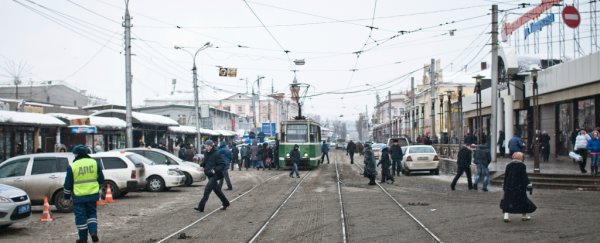At least 49 have died and 57 have been hospitalised in Russia after drinking a counterfeit herbal bath remedy that's commonly consumed as a cheap 'surrogate' alcohol.
As Russia's economy has plummeted in recent years, some Russians have increasingly turned to drinking products such as window cleaner, perfume, and medicinal bath soak - better known as Boyaryshnik - in place of vodka. But a recent analysis has shown that this particular batch of Boyaryshnik contained deadly levels of methanol and antifreeze, poisoning those who drunk it.
The deaths occurred in the Siberian city of Irkutsk, and officials have since declared a state of emergency in the region amid calls for better alcohol regulations. Experts estimate that around 12 million Russians each year consume these 'surrogate' alcohols.
Boyaryshnik is a concentrated liquid that's traditionally sold as a relaxant to be added to baths. But it's also commonly drunk as a cheap alcohol substitute, seeing as it sells for a maximum of around US$1 a bottle, compared with around US$3 for a half-litre of vodka.
In fact, it's become so common, Boyaryshnik was even put on sale in public vending machines earlier this year.
According to its label, the liquid is supposed to contain 93 percent ethanol, as well as hawthorn extract and lemon oils. But tests on the Irkutsk counterfeit batch show that it also contained toxic levels of methanol and antifreeze.
The label said that the product wasn't fit for consumption, but didn't mention the methanol or antifreeze.
Police have since found the underground lab where the counterfeit substance was made, and they've seized more than 500 litres of the substance form the shelves of 100 shops in Irkutsk, according to the Tass news agency.
The New York Times reports that seven people have been detained.
Reports of people being hospitalised as a result of the bath tincture started rolling in on the Monday afternoon, and by the evening, at least 49 people were confirmed dead, and many more had been hospitalised.
Officials have since gone door-to-door in Irkutsk looking for more casualties.
Unfortunately, this isn't the first time that Russian citizens have been poisoned by cheap alcohol substitutes, although this is the largest event so far.
And the problem isn't limited to Russia, with at least 20 people dying in the Czech Republic in 2012 after drinking methanol-laced liquor.
Russian Prime Minister Dmitry Medvedev told the press that they'll now be cracking down on the problem.
"We cannot put up with this any longer," he said, as The Guardian reports. "We must take all measures either to get this kind of product off the market, or to ensure full control of the way they are sold."
The issue is that, while the Russian economy has suffered from tighter trade regulations and falling oil prices, alcoholism is still a huge issue in the country.
A survey in 2014 showed that the average Russian adult drinks around 20 litres of vodka a year, compared with an average of 3 litres of spirits consumed annually by people in the UK.
And the Russian consumer rights watchdog agency reported earlier this year that alcohol abuse played a role in the premature death of 30 percent of men and 15 percent of women in the country.
And while heavy drinking of alcohol is bad enough, consuming unregulated surrogate alcohol is even worse.
"People are poorer, especially those who drink a lot, but the need for alcohol remains," independent Russian toxicologist Oleg Kuznetsov told The Guardian.
"Before, someone with alcohol dependency would go to the shop and buy the cheapest vodka, now he'll go and buy something different like window cleaner."
The government is now considering harsher laws for people who are involved in the black-market production of this surrogate alcohol.
Let's hope in the meantime no one else has to get hurt by these unregulated products.
